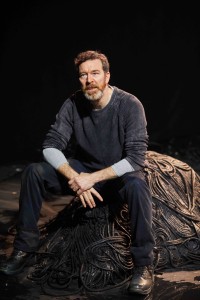Gary Owen’s writing can cut to the heart of the whys, the hows, and certainly with this play, the what ifs of ordinary people in extraordinary circumstances. He did it with the now internationally acclaimed Iphigenia in Splott and he is doing it again with his newest play Killology. His trick, it seems, is not to write grand profound statements but to show the profundity of the lives of ordinary people.
Sherman Theatre and The Royal Court have teamed up to produce this dark and emotive piece of writing, which brings themes of violence, technology, commercial ethics, and family power dynamics to the fore.
Owen wrote this play in response to reading Lt. Col. David Grossman’s book On Killing, a thesis that posits that young people are being conditioned by representations of violence through media leading to a rise in the number of murders among young people. Owen wanted to imagine how this might playout in a real-life scenario; his imagining is played out in Killology.
The story, or stories, present three characters, Alan and Davey, a father and son, and Paul a video game entrepreneur. Alan (Seán Gleeson) is a gruff Irish man who left his partner and child when his son was about 18 months old. Davey (Sion Daniel Young), Alan’s now teenage son, was born on the “wrong” side of town and is a product of what Gary Owen sees as something that may happen ‘when fathers don’t do as much as they should’ (Sherman interview with Gary Owen) despite progress in feminism.
Paul (Richard Mylan), the entrepreneur, has a very different provenance to Davey. He was born into wealth, and when he was 23 had a multi-million-pound idea: to create a game called Killology that places the player as a killer – more points are given the more sadistic the killing is, and points taken away the more empathy is shown.
Each character offers a series of monologues intertwined with each other both in structure and in content, sometimes breaking into duologues. All three perspectives end up hinging on the one tragic event (without giving too much away), in what appears to be a cause and effect experiment by Owen – e.g. what is at the root of Paul having imagined up this video game that encourages apathy towards human life and dignity.
Having opened with a short monologue from Alan which ends with the provocative line ‘and now I just have to sit tight, and wait for the man I am going to murder’, the tone is set for the evening. Then for almost all the rest of the first act we get accounts of the lives of Davey and Paul, and how their family life has affected them and leads to their inevitable doom, in one sense or other.
Sion Daniel Young
Richard Mylan
Seán Gleeson
All three actors do excellently with their respective briefs. Alan’s hard on the outside, soft on the inside demeanour, is played very well by Sean Gleeson, with some very powerful moments. Richard Mylan also does well in achieving a rich kid arrogance that makes you cringe and engage at the same time. Sion Daniel Young’s turn as Davey is brilliant both in its delivery of humour and playing of dread of the situation that he finds himself in.
I do wonder if the characters lack a little complexity, however, and even if this complexity can be achieved without the director and casting director taking to the streets, and finding a ‘real’ Davey, or Paul, and having them say the lines that Owen writes. I’d love to see this play a little less polished in terms of ‘good acting’ which we tend to prize so much, just to see what happens.
Gary McCann’s set is incredible, and the nearest I have been to stepping into the set of a computer game – mounds of heavy-duty black cables with the copper wire crudely sticking out at the ends dipping into puddles of water, forming rostra for the actors to delivery their lines. This is enhanced by a wonderfully atmospheric lighting design by Kevin Treacy, chiming in very well with Simon Slater’s score that emulates the intensity that a ‘point of view’ shooter stealth gaming experience tends to achieve at its best.
Director Rachel O’Riordan does very well in terms of drawing all the disparate elements together to create a seamless and provocative evening allowing Owen’s play, not to create, but to add to the ongoing debate about the place of violent video games in society and in exploring other aspects of the characters’ lives, we are not preached at from either side of that debate. As I alluded already, however, there may have been an opportunity missed in making this too ‘beautiful’ – perhaps it could be ‘roughed up’ a bit.
Sherman Theatre
Until April 8.
Images: Mark Douet


